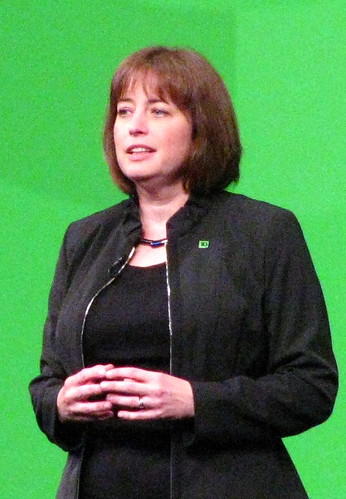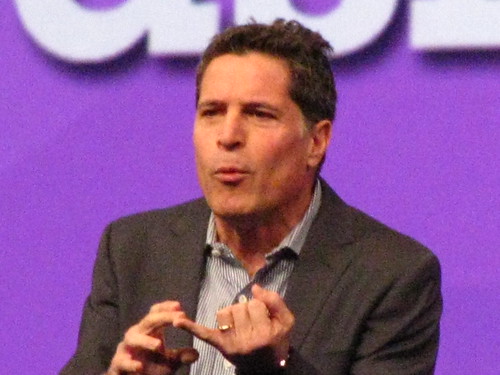Day Two of Lotusphere kicked off with a celebration of business transformation enabled by collaboration technology. Representatives from TD Bank Group and the author of a hot new book told stories of businesses that are rethinking the way business is done.

TD has grown to become North America’s sixth largest bank through acquisitions and a focus on listening to customers. A new social media team listens and responds to blogs, Facebook posts and tweets, the process “learning to be a better bank,” said Wendy Arnott (right, @Wendy_Arnott), VP for Social Media and Digital Communications.
The company has also transformed its internal communications using social networking technologies anchored by IBM Connections. Arnott ticked off the three key imperatives as aligning with core values, delivering real value and facing risks head on. To that end, the bank is endeavoring to involve employees in critical decisions.
Acknowledging the technical orientation of the Lotusphere audience, IBM also brought out TD’s CIO, Glenda Crisp (left, @GlendaCrisp) to talk about the importance of the IT-business partnership. Crisp said traditional project management was complemented by a collaboration steering committee that addressed issues like adoption barriers as well as technical problems like SharePoint integration.
The committed deemed it critical to make the shift to a shared platform as transparent as possible Single sign-on simplified access to Connections and Google search appliances were brought in to make enterprise-wide search seamless. Interviews with users also surface the importance of supporting mobile users of the bank’s dominant BlackBerry platform. “We made that a key factor in our selection criteria,” Crisp said.
The result of this active employee involvement was an adoption rate that exceeded expectations by a factor of seven. More than 50,000 users in Canada are up and running, and US deployment is expected to grow from 3,000 to more than 25,000 in less than a month.
Arnott ticked off success criteria:
- Get executive leadership sponsorship.
- Put a dedicated organization in place to oversee deployment.
- Deal with resistance by “getting into weeds with business teams and helping them discover how social will help them address business challenges.”
- Get employees involved on a volunteer basis and make sure their ideas count.
IBM next brought out Fast Company editor Bill Taylor (@practicallyrad) to address the need for business transformation. Taylor, whose new book is Practically Radical, asserted that in this age of commoditization, “The only way to stand out from the crowd is to stand for something special. Winning organizations today stand for new ideas,” he said. “The middle of the road has become the road to nowhere.”
 Taylor talked about the radical innovation embodied in the Henry Ford Health System in Detroit, which broke the mold when it built a new hospital in West Bloomfield, MI three years ago. Executives at the health care provider realized “they knew everything about surgery and pharmacology, but they knew nothing about what it took to make people feel right.”
Taylor talked about the radical innovation embodied in the Henry Ford Health System in Detroit, which broke the mold when it built a new hospital in West Bloomfield, MI three years ago. Executives at the health care provider realized “they knew everything about surgery and pharmacology, but they knew nothing about what it took to make people feel right.”
 Henry Ford Health recruited consultants from the hospitality and restaurant industries and conceived of a 160-acre facility that looks more like a resort (left) than a hospital. They created a file of more than 2,000 original healthy recipes that are in such demand that the hospital now books $1 million annually in catering revenues.
Henry Ford Health recruited consultants from the hospitality and restaurant industries and conceived of a 160-acre facility that looks more like a resort (left) than a hospital. They created a file of more than 2,000 original healthy recipes that are in such demand that the hospital now books $1 million annually in catering revenues.
The result is “a business home run because the approach from day one was so unconventional,” Taylor said.
Taylor also sang the praises of USAA, an insurance company that solely serves military customers. The 10-week employee orientation process there is more like a boot camp than a training course, he said. New recruits wear 65-lb. backpacks to simulate the working conditions of a infantry soldier and eat military rations. “They want to immerse their people in are the lives and experiences of their customers, which creates bonds not only with customers but also between employees,” he said.
Bottom line: “As you think about making your business more memorable, also think about how you make it more social.”
| This is one in a series of posts sponsored by IBM Midsize Business that explore people and technologies that enable midsize companies to innovate. In some cases, the topics are requested by IBM; however, the words and opinions are entirely my own. |

